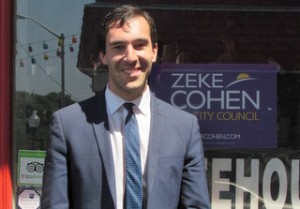
Zeke Cohen, a former teacher in Sandtown-Winchester, is running for City Council in southeast Baltimore’s first district. (Photo by Roberto Alejandro)
Zeke Cohen is running for City Council in Baltimore’s first district with a three-pronged platform: universal pre-k in Baltimore, improved police-community relationships, and a friendlier city for pedestrians.
Cohen came to the Baltimore area as an undergraduate at Goucher College, going on to teach in Sandtown-Winchester for a year through Teach for America. Since then, Cohen has run a non-profit that works with youth in the city (Cohen asked that the organization not be named since non-profits are barred from engaging in political activity).
While the City Council has earned something of a do-nothing reputation in recent years, Cohen said he is running nonetheless because of the Council’s “enormous potential to really be a voice for people throughout our city.”
“I don’t look at as a broken institution,” Cohen added later, “I look at it as a potentially great institution that can really play a role moving our city forward.”
One of the best ways for Baltimore to move forward, says Cohen, is to invest in early childhood education, even if the costs of doing so seem an obstacle at first blush.
“We need to think about our long-term fiscal health, and we know that pre-K, actually more than most social programs, pre-K prevents incarceration, it prevents welfare dependency, it leads kids toward a healthier future. So will there be an immediate cost increase in order to ? Absolutely, and we’re going to need to think really creatively about how we get there. But we’re spending about $40,000 a year (per person) to incarcerate people here in Maryland. It would cost about $4,000 a year (per person) to send everyone to pre-K,” said Cohen.
Such a plan would represent a moving away from a ‘war on drugs’ mentality that attempted to arrest its way out of the problem of illegal drugs and its incumbent violence, which Cohen said is really driven by “massive, concentrated policy and unemployment in certain communities.”
Moving away from a ‘war on drugs’ mentality also means reforming policing in a way that prioritizes public safety over making arrests, and which will require officers to spend less time in their vehicles and more time out and getting to know the communities they are supposed to safeguard. While Cohen feels that Baltimore Police Commissioner Anthony Batts has said a lot of the right things when it comes to community policing – and that the strained relationship between the police and Baltimore’s communities precede Batts’s tenure – more needs to be done at the street level to ensure police officers are building the sorts of relationships with citizens that facilitate the solving of crimes and the reduction of violence.
Doing this effectively means addressing the way many of us perceive underprivileged communities in particular. “Having taught in Sandtown, the way that community is perceived by our police – and, frankly, by our city, and by all of us, by our country – the way that community is perceived is much more that they are an expendable population, and there isn’t this level of trust, and comfort, and connection. And I would just say that across the board, regardless of race socioeconomic status, that there is some real value to policing that deeply values the communities in which the officers serve,” said Cohen.
The final prong of Cohen’s platform is making Baltimore more of a pedestrian friendly city. This will require two things, says Cohen: an efficient public transportation system and greater urgency in implementing the city’s Bicycle Master Plan. “I talk to a lot of people around Canton, and Patterson Park, and Highlandtown who would love to live in a city where they didn’t need to have a car, would love a viable, decent, public transportation system. And if you look at the cities that are making the leap and thriving, they’ve got really good public transit,” said Cohen.
Expanding the city’s popular circulator routes is a “no-brainer” according to Cohen, and the city ought to look at whether expanding the light-rail system would be an effective means of improving its transit options. Until public transit improves dramatically however, the city will have too many cars on its roads, affecting parking, road conditions, and the environment.
“In the long-term, we’re going to need to do better by public transit whether we like it or not, because this is not sustainable,” said Cohen.


